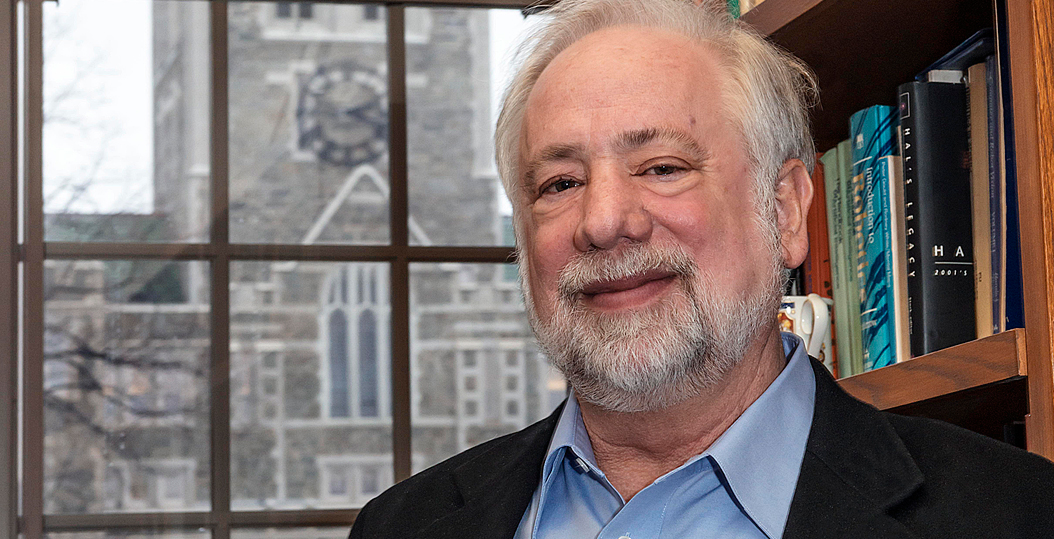James Gips—a beloved Carroll School professor who inspired generations of management students and improved the lives of countless others—has died at 72.
He began his storied career at Boston College in 1976, after earning a Ph.D. in computer science at Stanford University, and he taught up through the spring semester of this year—two sections of Intro to Programming for Management. Gips died unexpectedly on June 10, while recovering from surgery on his pancreas.
As the holder of the John R. and Pamela Egan Chair of Computer Science, Gips had a range of research interests. But his key focus was on helping those with severe disabilities lead fuller lives by interacting with computers and, by extension, the outside world. His EagleEyes technology uses electrodes to sense eye movements, allowing people to control a Windows computer just by moving their eyes. That technology led to Camera Mouse, which makes it possible for someone to control a mouse pointer with head movements (aided by a web cam that tracks the movements).
People with various disorders, including cerebral palsy, spinal muscular atrophy, and traumatic brain injury, have benefited from these assistive technologies. In a December 2016 profile of Gips, the Boston Globe reported that Camera Mouse—available as a free download since 2007—had exceeded three million downloads. That year, the information systems professor won a da Vinci Award from the American Society of Mechanical Engineers, honoring “exceptional design and engineering achievements in accessibility and universal design, that empowers people of all abilities.”
Gips often received emails like this one posted on his personal website: "Hi Jim, Remember me, my son has ALS. I finally bought a PC and want to thank you, and all your team from the bottom of my heart for CAMERA MOUSE!!! It’s a little miracle to you but a big miracle for my son to communicate. Works great, it's so fantastic. Bless you all for this precious gift to so many who lost their voice. I love you all!!!!”
In his own words, Gips revealed the depth of his concern and conviction when he wrote on the website that many with severe disabilities are “so locked in that people treat them as objects, as non-humans.” The professor said that through his research and inventions, he tried to give these people an opportunity to “show their humanity and be fully accepted as fellow human beings.”
Andy Boynton, the John and Linda Powers Family Dean of the Carroll School of Management, reacted to the news of his passing both as dean and as a 1978 alum of the School who was taught by Gips.
“When BC students take classes over the years they typically work hard, get their grades and move on,” Boynton said in an email to The Heights. “Not so for students fortunate enough to take the exceptional classes offered by Jim Gips. Through his superb teaching and thoughtful advising, Jim made a lasting impression and had far-reaching impact on many, many undergrads over the years (myself included) because he cared deeply about who we were as people and what we would do with our lives.”
Peter Olivieri, an information systems professor who retired in 2011 and collaborated with Gips on the assistive technologies, also spoke of his wide-ranging impact. “Jim was a wonderful person, kind and compassionate, bright and articulate, who loved his family, his students and his friends. He always asked his students to think about how they could make a difference, and how their knowledge could make the world a better place,” Olivieri told BC News.
After Boston College announced his passing, scores of students and alumni took to the University’s Facebook page to express their feelings about the man and his legacy. Julia MacDonald ’20 called Gips “one of the greatest people and professors I’ve ever had the privilege of knowing, who impacted me in ways that will far outlive my time at BC. You will be greatly missed.”
“Jim Gips gave voices and motion to non-verbal kids trapped in their [paralyzed] bodies, and taught generations of Boston College students that curiosity is everything,” wrote Andy LaMora, Morrissey College ’97. And he did it all, LaMora added, “with a smile.”
“There are no words to express how much impact Professor Gips had on the BC community and myself,” wrote Tiffany Liu ’19. “Thank you for letting me cry multiple times in your office and offering your wisdom when I most needed it. Your love of people, art and tea was an inspiration. You will be so, so missed.”
Atypically for professors, Gips made a practice of sharing student evaluations of his courses on his website. That includes the full surveys from the last course he taught, this past semester.
“You start out with absolutely no knowledge of programming and all of a sudden you’re building all kinds of cool programs,” wrote one student who took that class. “Even the homework was engaging (although sometimes really difficult) and it’s really rewarding to run your program and finally have it work.”
Other students wrote in the survey that “Professor Gips genuinely cares about his students” and that the class as taught by him “is one of the best courses that Boston College [offers], if not THE best.”
Where the evaluation form asks students to suggest ways that the course could be improved, an impressive number of them answered: “None.”
In a message to Carroll School faculty and staff, Boynton announced that in the fall, the School will host “a celebration to honor Jim and his contributions to scholarship and society.”



